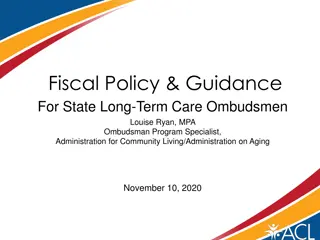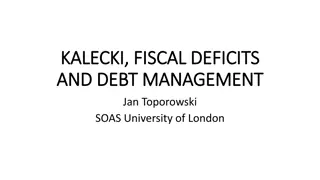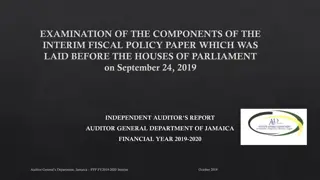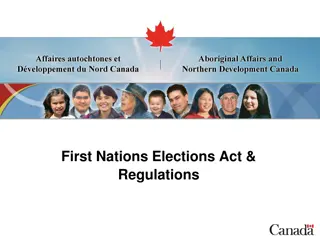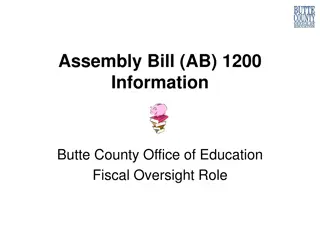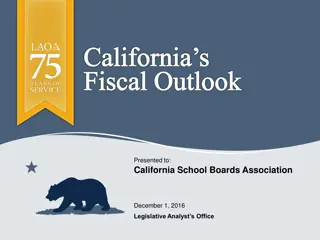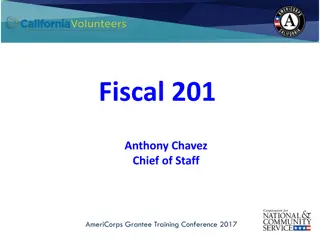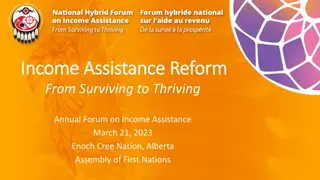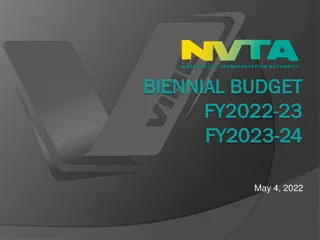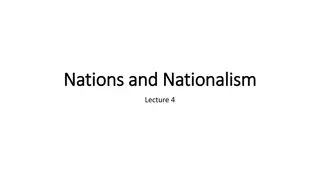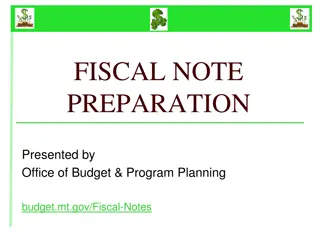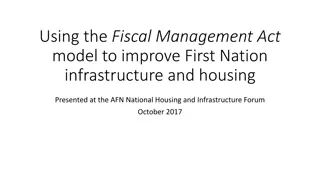Journey to Fiscal Relationship with First Nations
Reflect on the progress made in establishing a new fiscal relationship with First Nations, including the work of the Joint Advisory Committee and the challenges faced. Explore the journey from the Memorandum of Understanding in July 2016 to the development of a shared vision for mutual accountability and self-determination.
Download Presentation

Please find below an Image/Link to download the presentation.
The content on the website is provided AS IS for your information and personal use only. It may not be sold, licensed, or shared on other websites without obtaining consent from the author.If you encounter any issues during the download, it is possible that the publisher has removed the file from their server.
You are allowed to download the files provided on this website for personal or commercial use, subject to the condition that they are used lawfully. All files are the property of their respective owners.
The content on the website is provided AS IS for your information and personal use only. It may not be sold, licensed, or shared on other websites without obtaining consent from the author.
E N D
Presentation Transcript
Purpose Reflect on the journey to date on the new fiscal relationship with First Nations Update on work of the Joint Advisory Committee Looking ahead 2
New Fiscal Relationship with First Nations: journey so far July 2016 Memorandum of Understanding with the Assembly of First Nations 2016-17 Engagement with First Nations Joint development efforts December 2017- May 2018 Final Report under the MOU Recommendations accepted by AFN Chiefs-in-Assembly Policy development 10 year grants for qualified First Nations Default prevention reform Repeal of the First Nations Financial Transparency Act Advisory body to support ongoing co-development May 2018 - May 2019 Outreach and preparations for the 10-Year Grant Establishment of the Joint Assembly of First Nations Indigenous Services Canada Advisory Committee on Fiscal Relations Progress report to AFN Chiefs-in-Assembly Joint Advisory Committee developing its advice and recommendations 3
Shared understanding of challenges Fall 2017 engagement Funding Sufficiency Funding levels do not address First Nations needs and opportunities First Nation governments are highly reliant on federal transfers Insufficient economic development for many First Nations Dependency on transfers Inflexible and Unpredictable funding Government of Canada decides program goals, funding levels and timing Limited ability for First Nations to set priorities and choose where and when money should be spent Unresolved lands and resource issues Revenue generation options such as taxation underutilized Provincial and territorial governments not participating fully Revenue Generation Administrative & reporting burden Program specific and overlapping reporting leaves burden on First Nation governments too high Too many application-based programs Focus on compliance not outcomes Accountability is compliance based, rather than focussed on outcomes Socio-economic gaps have not been closing 4
Shared vision from the December 2017 report The new fiscal relationship should: constitute a regime that by design recognizes and is responsive to First Nations' right to self-determination a recognition-of-rights approach be founded on a mutual accountability relationship whereby First Nations governments are primarily accountable to their own citizens, while the Government of Canada and First Nations governments hold one another mutually accountable for the commitments they make to one another ensure sufficient funding empower First Nations to plan and invest based on their own priorities, by ensuring greater predictability, flexibility and autonomy of funding arrangements underpin progress toward the elimination of socio-economic gaps 5
Joint Advisory Committee on Fiscal Relations Terms of reference developed jointly with committee members Made up of 14 members - the Assembly of First Nations and Indigenous Services Canada recommended an equal number of candidates with the aim of balancing regional interests and ensuring relevant technical expertise Appointments valid until March 31, 2020. Meetings held: Nov. 14-15, 2018 Dec. 3, 2018 Jan. 7-9, 2019 Feb. 4-5, 2019 Mar. 4-5, 2019 April 28-29, 2019 6
Joint Advisory Committee Members Technical Representatives Harold Calla, First Nations Financial Management Board Don Drummond, Queen s University Terry Goodtrack, Aboriginal Financial Officers Association Bonny Healy, First Nations Information Governance Centre Kevin Page, University of Ottawa Regional Representatives Chief Richard Sidney, Chief Executive Officer, Teslin Tlingit Council Richard Nerysoo, Executive, Gwitch in Tribal Council Chief David Jimmie, Squiala First Nation Chief Lee Crowchild, Tsuut ina Nation Vice-Chief Heather Bear, Federation of Sovereign Indigenous Nations Chief Christian Sinclair, Opaskwayak Cree Nation Chief Laurie Carr, Hiawatha First Nation Chief Connie Lazore, District Chief, Mohawk Council of Akwesasne John Paul, Executive Director, Atlantic Policy Congress of First Nations Chiefs 7
Mandate: Build on recommendations of December 2017 report Recommendations for implementing a new fiscal relationship and broad engagement with First Nations. Recommendations for a new Fiscal Policy Framework to address funding sufficiency and identify priority funding areas, including recommendations for a permanent First Nations fiscal policy body. Recommendations for increasing revenue generation opportunities for First Nations, to be developed in collaboration with First Nations, provinces and territories. Recommendations for strengthening the commitment to flexible and predictable funding, to reduce reporting burdens and shift from program to outcome-based reporting and funding. Recommendations for development of a national outcomes-based indicators framework. 8
Joint Advisory Committee deliberations The committee is considering priorities for its recommendations: Proposals for a new fiscal policy framework to address: Catch up & keep up funding for all First Nations Revenue generation opportunities for all First Nations New opt-in statutory transfer mechanism Proposals on governance to address: Financial support for First Nation governments Capacity enhancement support for First Nations governments Strengthen First Nations institutions & service providers Focus on: Respect for First Nations rights, treaties, title and jurisdiction Measures to support self-determination, leading to increased well-being First Nations ownership, control, access and possession of their data Objective, evidence-based approaches, and continuous improvement 9
Next Steps for Joint Advisory Committee Spring 2019: Committee to report to ISC Minister and AFN National Chief, with regional engagement to follow July 2019: Update to AFN Annual General Assembly 10






